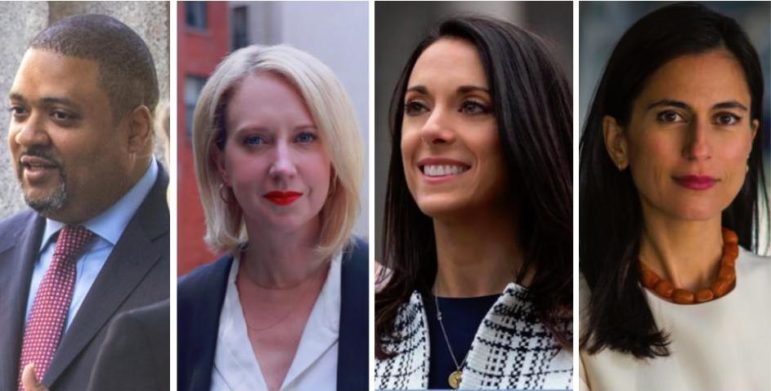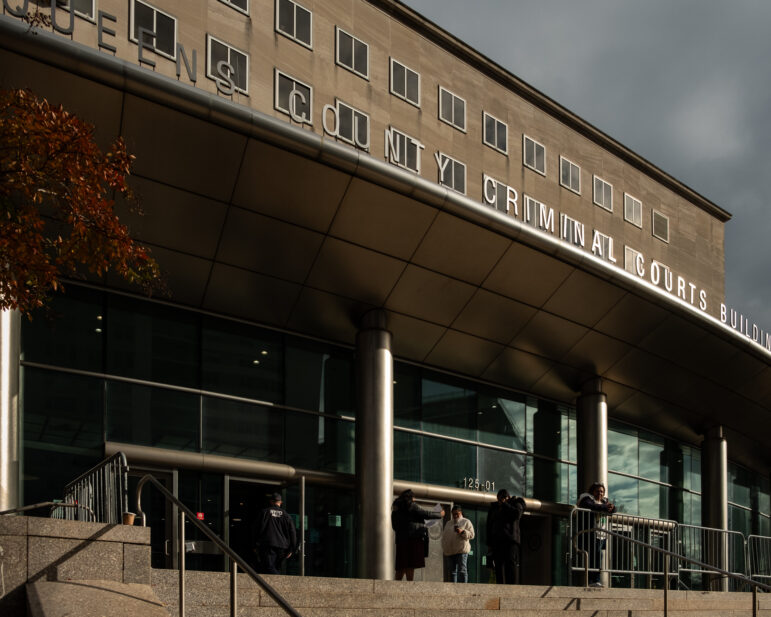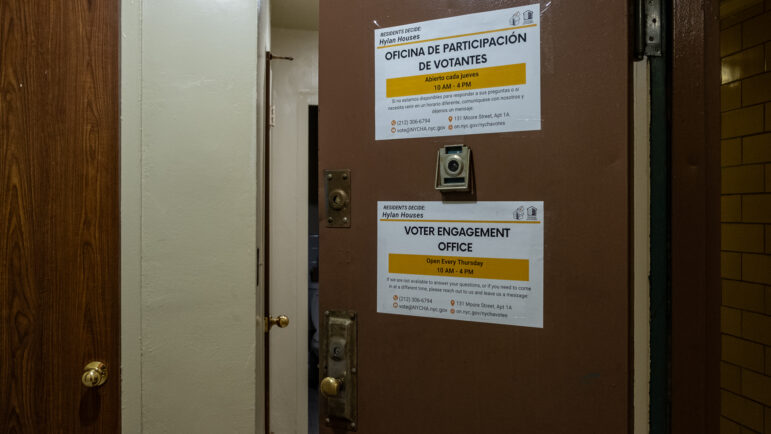While two candidates reported having more than a million on hand to fuel a five-month push to the Democratic primary, two others released policy plans for conviction review and re-entry planning.

Candidates’ campaign websites
Four in the field for Manhattan DA, from left to right: Alvin Bragg, Lucy Lang, Eliza Orlins and Tali Farhadian Weinstein.Candidates for Manhattan district attorney are pushing new policy ideas as fundraising numbers show two candidates carrying six-figure balances into the final five months of the race.
In the past week, Eliza Orlins proposed a newly aggressive Conviction Review Unit, and Lucy Lang pitched a new role for the next DA in facilitating re-entry after incarceration. They are the latest meaty policy proposals in a contest where a crackdown on exploitative landlords, stronger wage-theft protections, a focus on stopping elder scams and a tougher approach to police misconduct have already been floated.
The new policy pitches came after Tali Farhadian Weinstein’s campaign said on Jan. 12 that she had raised $2.25 million for the race. On Tuesday, Alvin Bragg announced a total haul of $1.3 million.
Weinstein and Bragg reported $1.6 million and $1 million cash on hand, respectively.
That put them ahead of the other declared Democrats in the June primary: Dan Quart with $940,000 in the bank, Tahanie Aboushi with $561,000, Lang with $533,000, Orlins with $407,000, Diana Florence with $238,000 and Elizabeth Crotty with $167,000. Incumbent DA Cyrus Vance, Jr.—who could run again but has not announced his intentions—has just $4,193.62 in his campaign account.
Big donors dominate top fundraiser’s haul
Both Weinstein and Bragg emphasized the grassroots aspects of their fundraising. Weinstein’s campaign, for instance, noted that her funding “included more than 1,700 contributions of $200 or less, and 95 percent of those were under $101, indicating widespread support across communities.”
Weinstein’s campaign said she “is the only candidate in the race to have limited herself to accepting just $1 from any lawyer who works in a firm with a criminal defense practice in New York City” and “does not accept contributions from attorneys currently employed by the Office of the Manhattan District Attorney, or from unions that represent members of law enforcement agencies that work with the District Attorney’s Office.”
Bragg’s representative, meanwhile, said, “Alvin is the only candidate who has filed that has received only contributions from individuals” and adds, “Alvin has taken no money from corporations, law enforcement, or lawyers who have appeared before the Manhattan District Attorney in the last four years.”
Both campaigns boasted of how much of their money came from Manhattan: Weinstein’s said nearly 75 percent of her funding was Manhattan-based*, while Bragg’s people said he “has the most donations from Manhattan, by far.”
But both campaigns also received significant amounts from extremely large donors—Weinstein far more so.
She recorded checks of $35,400—New York’s individual donation maximum—from 11 people, including financiers Frederick Iseman, Zachary Schreiber and David Einhorn. The vast majority of Weinstein’s money ($1.8 million, or 80 percent of it) came in donations of $5,000 or greater. She also booked a $10,000 donation from a limited liability corporation based in Florida that business records indicate is partly managed by legendary hedge-fund managed David Tepper, who own’s the NFL’s Carolina Panthers.
More than $367,000 of Bragg’s haul (about 28 percent of his take) came from donors giving $5,000 or more, including two at the $35,400 maximum: Stacy Schusterman and James McClave. Schusterman runs Samson Energy Company, LLC, a private oil and gas company, and McClave is a partner at a trading firm called Jane Street. They are both major Democratic donors.
Proposing a very powerful Conviction Review Unit
Orlins call for a Conviction Review Unit was her first major policy proposal of the race. While such units are not uncommon, Orlins’ would be unique in several important respects.
First, it would operate independently, answering only to the DA. Second, staff in the unit will not focus only on old cases but “will have the authority to be proactive, to step in on active cases at any stage of the process to make sure the system gets it right the first time.” The unit would review every case, including plea bargains and indictments, and “an explicit goal of the Conviction Review Unit will be to drop or reduce as many cases as possible.”
The unit will also collect and analyze data on how the DA’s office handles cases “to identify when cases appear to deviate from the defined targets set by my policies.” The focus will be on “sentences that are too long, plea bargains that change after trial, criminal charges that were not preceded by an attempt at diversion” and other features. “While these flags are not indicative in themselves of wrong action, they must at least be identified in order for the Conviction Review Unit to evaluate them,” Orlins’ policy paper reads.
Meanwhile, Lang’s re-entry policy would aim to reduce recidivism and limit the damage of incarceration by, at the front end, avoiding prison where possible.
Among other things, she promises to “devise responsible charge declination policies that account for historical inequities, particularly with respect to policing of communities of color, and structural inequalities that contribute to poverty, resulting in increased quality-of-life and other non-violent conduct.” Lang also pledges to waive court charges, fines and fees to avoid presenting low-income defendants with a higher financial barrier to clearing their cases. When prison is necessary, she says her prosecutors will advocate to put people in prisons close to their families and with the services they need, and begin talking about life after prison even before the case is disposed.
On the back end, the DA would have less direct control of how a person’s transition from prison to freedom might go, but Lang vows to advocate for programs and policies that make reentry easier. She also promises to hire “formerly incarcerated people to work at the DA’s office in a variety of policy and office functions,” actively try to get people’s records sealed or expunged and work with community groups to connect people coming out with help.
*Correction: The original version of this article originally reported that Weinstein had claimed 75 percent of her donors were Manhattan-based. In fact, her claim was that nearly 75 percent of her funding (meanwhile all the money she raised) came from Manhattan-based donors.









One thought on “Fundraising Boasts and Policy Ideas as Manhattan DA’s Race Heats Up”
Biased coverage@